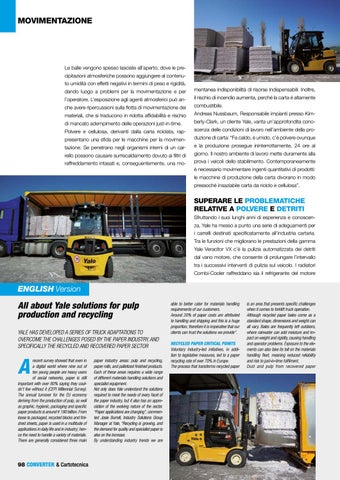MOVIMENTAZIONE
Le balle vengono spesso lasciate all’aperto, dove le precipitazioni atmosferiche possono aggiungere al contenuto umidità con effetti negativi in termini di peso e rigidità, dando luogo a problemi per la movimentazione e per
mentanea indisponibilità di risorse indispensabili. Inoltre,
l’operatore. L’esposizione agli agenti atmosferici può an-
il rischio di incendio aumenta, perché la carta è altamente
che avere ripercussioni sulla flotta di movimentazione dei
combustibile.
materiali, che si traducono in ridotta affidabilità e rischio
Andreas Nussbaum, Responsabile impianti presso Kim-
di mancato adempimento delle operazioni just-in-time.
berly-Clark, un cliente Yale, vanta un’approfondita cono-
Polvere e cellulosa, derivanti dalla carta riciclata, rap-
scenza delle condizioni di lavoro nell’ambiente della pro-
presentano una sfida per le macchine per la movimen-
duzione di carta: “Fa caldo, è umido, c’è polvere ovunque
tazione. Se penetrano negli organismi interni di un car-
e la produzione prosegue ininterrottamente, 24 ore al
rello possono causare surriscaldamento dovuto ai filtri di
giorno. Il nostro ambiente di lavoro mette duramente alla
raffreddamento intasati e, conseguentemente, una mo-
prova i veicoli dello stabilimento. Contemporaneamente è necessario movimentare ingenti quantitativi di prodotti: le macchine di produzione della carta divorano in modo pressoché insaziabile carta da riciclo e cellulosa”.
SUPERARE LE PROBLEMATICHE RELATIVE A POLVERE E DETRITI Sfruttando i suoi lunghi anni di esperienza e conoscenza, Yale ha messo a punto una serie di adeguamenti per i carrelli destinati specificatamente all’industria cartaria. Tra le funzioni che migliorano le prestazioni della gamma Yale Veracitor VX c’è la pulizia automatizzata dei detriti dal vano motore, che consente di prolungare l’intervallo tra i successivi interventi di pulizia sul veicolo. I radiatori Combi-Cooler raffreddano sia il refrigerante del motore
ENGLISH Version
All about Yale solutions for pulp production and recycling YALE HAS DEVELOPED A SERIES OF TRUCK ADAPTATIONS TO OVERCOME THE CHALLENGES POSED BY THE PAPER INDUSTRY, AND SPECIFICALLY THE RECYCLED AND RECOVERED PAPER SECTOR
A
recent survey showed that even in a digital world where nine out of ten young people are heavy users of social networks, paper is still important with over 80% saying they couldn’t live without it (CEPI Millennial Survey). The annual turnover for the EU economy deriving from the production of pulp, as well as graphic, hygienic, packaging and specific paper products is around € 180 billion. From loose to packaged, recycled blocks and finished sheets, paper is used in a multitude of applications in daily life and in industry; hence the need to handle a variety of materials. There are generally considered three main
98 CONVERTER & Cartotecnica
paper industry areas: pulp and recycling, paper rolls, and palletized finished products. Each of these areas requires a wide range of different materials handling solutions and specialist equipment. Not only does Yale understand the solutions required to meet the needs of every facet of the paper industry, but it also has an appreciation of the evolving nature of the sector. “Paper applications are changing”, commented Josie Burrell, Industry Solutions Group Manager at Yale, “Recycling is growing, and the demand for quality and specialist paper is also on the increase. By understanding industry trends we are
able to better cater for materials handling requirements of our customers. Around 20% of paper costs are attributed to handling and shipping and this is a huge proportion; therefore it is imperative that our clients can trust the solutions we provide”. RECYCLED PAPER CRITICAL POINTS Voluntary industry-led initiatives, in addition to legislative measures, led to a paper recycling rate of over 70% in Europe. The process that transforms recycled paper
is an area that presents specific challenges when it comes to forklift truck operation. Although recycled paper bales come as a standard shape, dimensions and weight can all vary. Bales are frequently left outdoors, where rainwater can add moisture and impact on weight and rigidity, causing handling and operator problems. Exposure to the elements can also take its toll on the materials handling fleet, meaning reduced reliability and risk to just-in-time fulfilment. Dust and pulp from recovered paper

















